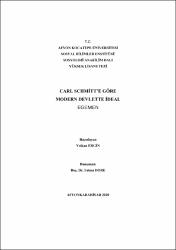| dc.contributor.advisor | Dore, Fatma | |
| dc.contributor.author | Ergin, Volkan | |
| dc.date.accessioned | 2021-11-25T07:20:13Z | |
| dc.date.available | 2021-11-25T07:20:13Z | |
| dc.date.issued | 2020 | en_US |
| dc.date.submitted | 2020 | |
| dc.identifier.uri | https://hdl.handle.net/11630/9776 | |
| dc.description.abstract | Egemenlik kavramı siyasal teorinin en çok tartışılan kavramlarından birisi olmuştur. Bunun en önemli sebebi temelde iktidar olgusu ile olan yakın ilişkisidir. Siyasal düşüncede ideolojilerin kavranması ve yorumlanması, iktidar kavramını konumlandırmaları ekseninde şekillenen bir egemenlik anlayışı tartışmasını gerekli kılmaktadır. Bu açıdan, egemenlik anlayışı üzerinden tarihsel bir okuma ideolojik değişimlerin kavranmasına da imkan verecektir.
Çalışmada egemenlik anlayışı üzerinden yapılan tarihsel okumanın ana eksenini Carl Schmitt'in egemenlik anlayışı oluşturmaktadır. Mutlak egemenlik kavramlarının tarihsel arka planı ile beslenen Schmittyen anlayışın, özellikle liberalizm eleştirilerinde açığa çıkan, tarihsel ideolojik dönüşümde izlerini bulmanın mümkün olduğu savunulmuştur. Schmitt'in liberalizme egemenlik anlayışı noktasında getirdiği eleştirileri haklı çıkarır şekilde; klasik liberalizmden neoliberalizme doğru gerçekleşen ve egemenlik anlayışında etkili bir dönüşümün yaşanması, süreci Schmitt'e referans vererek okumayı mümkün kılmıştır. Liberalizmin egemenlik anlayışı, iktidarı konumlandırışı ve yirminci yüzyılda gerçekleşen konjektürel savaşlarla beraber ön plana çıkan kavramların, Schmityen bakış açısıyla değerlendirilmesi yapılmıştır. Modern devlet anlayışının kaynağı itibariyle Tanrı anlayışından uzaklaşması ile istisnai durumlarda karar vericinin kim olacağı muğlaklığı çalışmada giderilmeye çalışılmıştır. Çalışmada istisnai duruma karar verecek olan Egemenin, Schmitt'in görüş ve düşünceleriyle klasik liberal anlayıştaki parlamento kararını beklemeden anayasayı askıya alarak tüm yetkinin kendisinde toplandığı bir anlayış ileri sürülmüştür. Modern devletin yerine total devleti koyan Schmitt, liberalizmi eleştirerek kendi devlet modeleni oluşturmaya çalışmıştır. Tarihsel süreçte liberalizm içerisinde yaşanan dönüşümü Schmitt'in eleştirileri ile ilişkilendirebilmek, Schmitt'in siyaset anlayışının siyasal düşüncede merkezi ve güncel bir tartışma alanı yarattığını göstermektedir. | en_US |
| dc.description.abstract | The concept of sovereignty has been one of the most discussed concepts of political theory. The most important reason for this is its close relationship with the phenomenon of power on the basis. The comprehension and interpretation of ideologies in political thought necessitates a discussion of the conception of sovereignty shaped around their positioning the concept of power. In this regard, a historical reading through the understanding of sovereignty will also enable the understanding of ideological changes.
Carl Schmitt's understanding of sovereignty constitutes the main axis of the historical reading made through the understanding of sovereignty. In the study, it has been argued that it is possible to find traces of the historical ideological transformation that emerged especially in the criticism of liberalism of the Schmittian understanding, which is fed by the historical background of the concepts of absolute sovereignty. In a way that justifies the criticisms that Schmitt brought to liberalism at the point of understanding of sovereignty; experiencing an effective transformation in the understanding of sovereignty from classical liberalism to neoliberalism made it possible to read the process by referencing Schmitt. Liberalism's conception of sovereignty, it's positioning of power and the concepts that came to the fore with conjunctural wars in the twentieth century were evaluated with Schmitten's perspective. In the study, the ambiguity of who will be the decision-maker in exceptional situations with the modern conception of the state moving away from the conception of God has been tried to be eliminated. In the study, with the views and thoughts of the Sovereign, who will decide on the exceptional situation, Schmitt's views and thoughts put forward an understanding in which all authority is gathered by suspending the constitution without waiting for the parliament decision in the classical liberal understanding. Replacing the modern state with the total state, Schmitt criticized liberalism and tried to create its state model. Being able to associate the transformation in liberalism in the historical process with Schmitt's criticism shows that Schmitt's understanding of politics created a central and contemporary discussion area in political thought. | en_US |
| dc.language.iso | tur | en_US |
| dc.publisher | Afyon Kocatepe Üniversitesi Sosyal Bilimler Enstitüsü | en_US |
| dc.rights | info:eu-repo/semantics/openAccess | en_US |
| dc.subject | Modern Devlet | en_US |
| dc.subject | Liberalizm | en_US |
| dc.subject | Demokrasi | en_US |
| dc.subject | Egemen | en_US |
| dc.subject | İstisnai Durum | en_US |
| dc.title | Carl Schmitt’e göre modern devlette ideal egemen | en_US |
| dc.title.alternative | The ideal sovereign in the modern state according to Carl Schmitt | en_US |
| dc.type | masterThesis | en_US |
| dc.department | Enstitüler, Sosyal Bilimler Enstitüsü, Sosyoloji Ana Bilim Dalı | en_US |
| dc.relation.publicationcategory | Tez | en_US |
| dc.contributor.institutionauthor | Ergin, Volkan | |



















